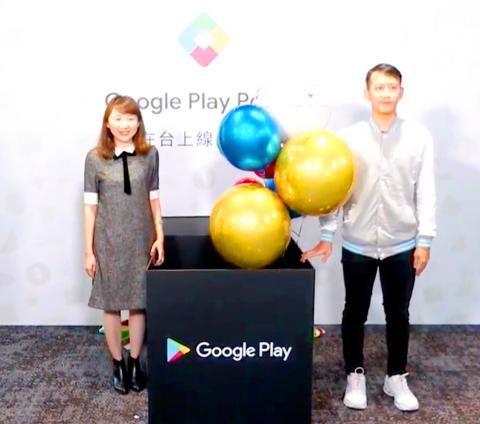Taiwan is to be the fourth nation after Japan, South Korea and the US to enjoy Google Play Points, a reward program that allows users to earn reward points, Google Taiwan announced yesterday.
The program allows “the entire ecosystem of Google Play to take root,” while developers can also use the reward system to drive downloads and exposure of their apps, Google Taiwan general manager Tina Lin (林雅芳) told an online media event.
Google Play Points is a way of giving customers a chance to earn credits on purchases they make in the Google Play store, the company said.

Photo: CNA
The points earned can be used for discounts or special items and content in apps and games, it said.
A points-based reward system is a common practice in the general retail market and is a strategy used by many businesses to help boost customer loyalty, Lin said.
Taiwan is Google Play’s fifth-biggest market in the world, hence the reason for launching the reward program in the nation, she said.
It has a developed consumer market and there is ample demand, she added.
Google Play product marketing manager Liu Ming-wei (劉明維) said that users in Taiwan would get to experience Google Play Points on their mobile devices later this week.

Three experts in the high technology industry have said that US President Donald Trump’s pledge to impose higher tariffs on Taiwanese semiconductors is part of an effort to force Taiwan Semiconductor Manufacturing Co (TSMC, 台積電) to the negotiating table. In a speech to Republicans on Jan. 27, Trump said he intends to impose tariffs on Taiwan to bring chip production to the US. “The incentive is going to be they’re not going to want to pay a 25, 50 or even a 100 percent tax,” he said. Darson Chiu (邱達生), an economics professor at Taichung-based Tunghai University and director-general of

Hon Hai Precision Industry Co (鴻海精密) is reportedly making another pass at Nissan Motor Co, as the Japanese automaker's tie-up with Honda Motor Co falls apart. Nissan shares rose as much as 6 percent after Taiwan’s Central News Agency reported that Hon Hai chairman Young Liu (劉揚偉) instructed former Nissan executive Jun Seki to connect with French carmaker Renault SA, which holds about 36 percent of Nissan’s stock. Hon Hai, the Taiwanese iPhone-maker also known as Foxconn Technology Group (富士康科技集團), was exploring an investment or buyout of Nissan last year, but backed off in December after the Japanese carmaker penned a deal

WASHINGTON POLICY: Tariffs of 10 percent or more and other new costs are tipped to hit shipments of small parcels, cutting export growth by 1.3 percentage points The decision by US President Donald Trump to ban Chinese companies from using a US tariff loophole would hit tens of billions of dollars of trade and reduce China’s economic growth this year, according to new estimates by economists at Nomura Holdings Inc. According to Nomura’s estimates, last year companies such as Shein (希音) and PDD Holdings Inc’s (拼多多控股) Temu shipped US$46 billion of small parcels to the US to take advantage of the rule that allows items with a declared value under US$800 to enter the US tariff-free. Tariffs of 10 percent or more and other new costs would slash such

SENSOR BUSINESS: The Taiwanese company said that a public tender offer would begin on May 7 through its wholly owned subsidiary Yageo Electronics Japan Yageo Corp (國巨), one of the world’s top three suppliers of passive components, yesterday said it is to launch a tender offer to fully acquire Japan’s Shibaura Electronics Co for up to ¥65.57 billion (US$429.37 million), with an aim to expand its sensor business. The tender offer would be a crucial step for the company to expand its sensor business, Yageo said. Shibaura Electronics is the world’s largest supplier of thermistors, with a market share of 13 percent, research conducted in 2022 by the Japanese firm showed. If a deal goes ahead, it would be the second acquisition of a sensor business since